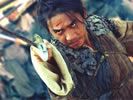Eye For Film >> Movies >> Ashes Of Time Redux (2008) Film Review
First released back in 1994, Ashes Of Time is loosely based on characters from Louis Cha’s martial arts novel The Eagle-Shooting Heroes, winding back in time to imagine the early lives of the novel’s Lords of the East and West. Down the years, several versions found their way into circulation and so, on hearing that some of the negatives and sound material were in danger due to a lab in Hong Kong which stored them suddenly shutting down, Wong Kar Wai saw it as an opportunity to revisit the work.
The end result is Ashes Of Time Redux, which unusually for a ‘director’s cut’ is actually shorter than the original work. This reviewer did not have the benefit of catching the original version, so will not barge in to comparisons. Those looking for information on the differences – which most critics who have seen both versions acknowledge to be subtle – might want to read Derek Elley’s succinct analysis of them for Variety.

Stemming from the jianghu tradition – a sort of alternative reality that martial arts tales inhabit – Kar Wai lays the dreamy layers on thick in this elliptical tale which has as much to do with the emotions of man and nature of memory and loss as it does with swordsmanship (of which, martial arts fans be warned, there is very little). Where other films in the wuxia pian – “martial chivalry films” – such as Hero (which clearly owes some debt to this) – have a fixed, if mythic, storyline, watching Ashes Of Time is akin to hearing the whispers of many stories overlapping one another but with the same emotional truths at heart.
The narrative shifts like the sands of the deserts where the central protagonist Ouyang Feng lives. Still living with the regret of a love not taken, he has become a ‘fixer’ of sorts, arranging for swords-for-hire to fulfil assassinations, although not getting his hands dirty himself. Each year, he is visited by his friend Huang Yaoshi. Like so many aspects of the story, one is the yin to the other’s yang. Where Feng is strictly business, Yaoshi has an adventurer’s soul. In the year we meet them, Yaoshi brings with him a mysterious wine, given to him by a woman, which he says will make the drinker forget their memories. It is this idea of memory, coupled with a melancholic regret, which will tinge the rest of the episodic narrative.
Seasons change and characters come and go – a brother and sister, appropriately named Yin and Yang, who may or may not be one and the same person, a woman desperate for vengeance but with only eggs to offer in trade, a young and reckless swordsman and the woman who lies at the heart of Feng’s deepest regret.
Each of these storylines wash over one another, refusing to take on a fully-fledged shape and yet they have a surprisingly cohesive cumulative effect. Dreamy even before you consider the dream sequences, Kar Wai’s camerawork adds to this feeling of hinted truths. People’s faces flicker with reflected light from pools or are glimpsed, fragmented, through the bars of a bird cage, while conversations are often witnessed through flapping cloth, as though viewed surreptitiously from a distance.
This is visually beautiful and the performances have a purity to match – Feng’s melancholy is somehow magnified by knowing actor Leslie Cheung would go on to take his own life, while Maggie Cheung’s astonishingly poignant soliloquy makes you wonder why she isn’t in constant demand. Although the story may leave you unable to find your “who?” from your “what?”, and “when?” becomes a seriously relative term, this has a powerful poetry that draws you to it – and will leave you wanting to watch it again. There is a sense that while some of the themes and characters are tricky to pin down, this is not just a case of being wilfully arty. Rather it is the characters’ very fluidity that allows the age-old themes of love and loss, madness and sanity, youth and old age, and memory and forgetfulness to shine through.
Reviewed on: 17 Sep 2008


















